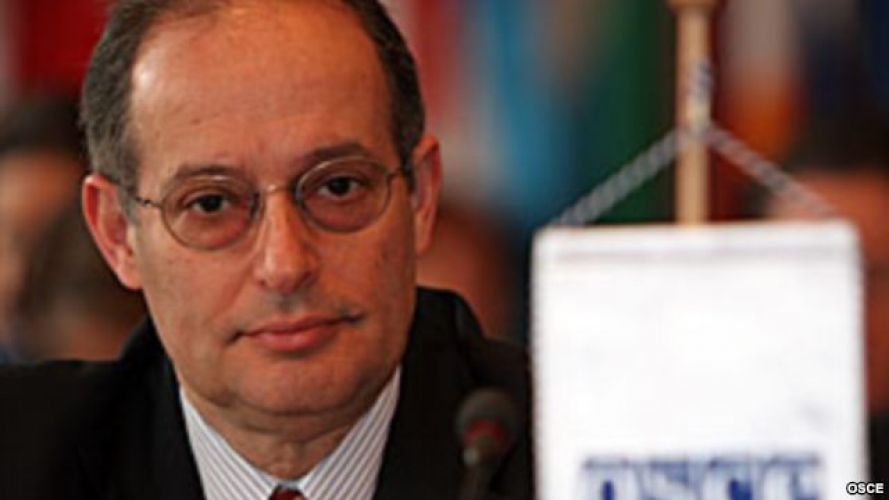The United Nations Special Rapporteur described the violent crackdown on peaceful protesters in February-March of this year as revealing the cyclical nature of oppression of human rights in Belarus. He also warned that the trials to be held in the near future could potentially lead to a new set of political prisoners.
“Only some months after the Government of Belarus had seemed to ease the curbs on dissent voices, the new wave of violent nationwide repression hit thousands who were peacefully protesting against an ill-designed social measure”, Haraszti said presenting his new report to the Human Rights Council.
“More than a thousand were arbitrarily detained, showing that Belarus returned to its practice of silencing those who make use of their basic civil rights,” he noted.
Mr. Haraszti said that it was vital for international scrutiny to continue, as the severe crackdown on peaceful protesters and the lack of efforts at reforming the laws and policies underlying to the recurring oppression had revealed the “cyclical” nature of human rights abuses in Belarus.
“The March events displayed a periodically returning element in the authorities’ handling of human rights,” he said “Their reaction was woefully identical with the response the authorities gave to the demonstrations following the presidential election of 2010, the particular cycle of massive oppression that prompted the Human Rights Council to create my mandate.”
The Special Rapporteur noticed a few positive developments on human rights in Belarus since June last year, such as the allowance for two members of opposition to enter Parliament following the elections of September 2016; as well as the registration of the ‘Tell the Truth’ movement last month, albeit not as a political organisation.
“The authorities announced a plan of implementation of selected human rights recommendations,” he said. “Unfortunately, even if the list of these 100 activities was fully implemented, the reality of human rights on the ground would not change, as civil society organizations were not associated to its development, and because the plan does not address the systemic and long-known human rights issues of Belarus.”
The Special Rapporteur recalled the continuing application of the ‘permission-based’ regime in regard to the NGOs’ registration.
“The cornerstone of systemic oppression of human rights is article 193.1 of the Penal Code which criminalizes any public activity not pre-authorized by officials. Today, all citizens of Belarus who decide to exercise their civic rights de jure commit a crime, and it is up to the authorities’ arbitrary decisions when they would become de facto criminals, exposed to law enforcement violence and to the whims of a juridical system without due trial and equality before the law,” Mr. Haraszti underlined.
“Belarus’ cyclical approach to human rights finds another proof in the application of the death penalty,” the expert added.
He said: “In 2016 only, Belarus executed four individuals, which is the highest number since 2008. After the cut-off date of my report, another individual was executed in April. The conditions under which executions are conducted continue to amount to cruel handling, just as the judicial system still denies the right to a fair trial.”
Mr. Haraszti also stressed the potential for a new set of political prisoners, another recurring issue in Belarus.
“As of today, a dozen of arrested are accused of having plotted against the State or having prepared riots. There are credible allegations of recourse to torture in order to coerce them into confessing to the politically motivated accusations,” he noted.
“This procedure is conducted without any public communications, and it raises the danger of a new round of political detainees after Belarus released its last political prisoners on the eve of the presidential elections of 2015,” the Special Rapporteur said.
It should be noted, that national and international human rights defenders advocate for the extension of the mandate of the UN special rapporteur on Belarus. The need to do this was discussed during the meetings with representatives of various countries’ representatives in Human Rights Council in Geneva, which were conducted from 30 May to 1 June.
We remind, that Mr. Miklós Haraszti (Hungary) was designated as Special Rapporteur on the situation of human rights in Belarus by the UN Human Rights Council in 2012.
Special Rapporteurs are part of what is known as the Special Procedures of the Human Rights Council. Special Procedures, the largest body of independent experts in the UN Human Rights system, is the general name of the Council’s independent fact-finding and monitoring mechanisms that address either specific country situations or thematic issues in all parts of the world. Special Procedures’ experts work on a voluntary basis; they are not UN staff and do not receive a salary for their work. They are independent from any government or organization and serve in their individual capacity.
Related articles:





